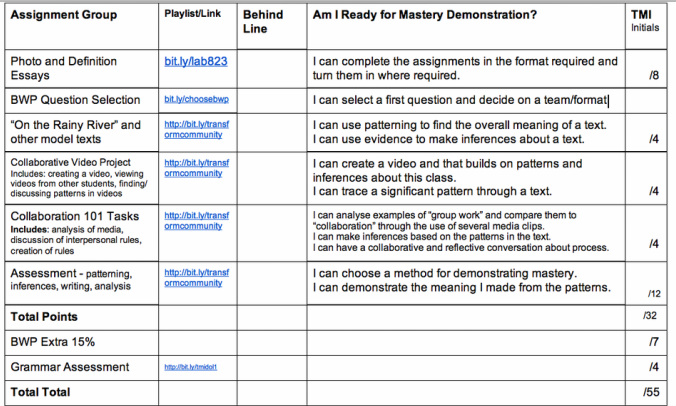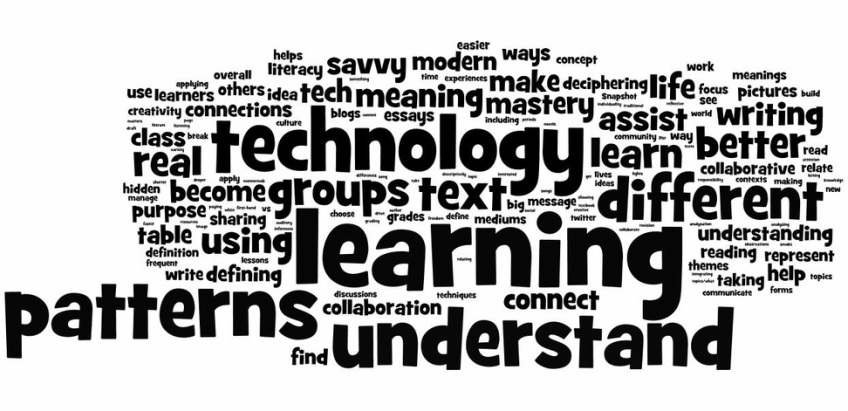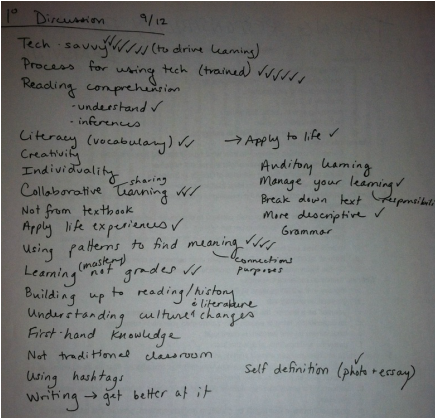It's a hard question to answer because I believed that I never had to have anyone motivating me to do my schoolwork.
But that's not entirely true. There are many times (even now as an adult) that I act much like my students who would be on the "not taking responsibility for learning" list. So I tried to find patterns. Here's what I came up with:
1. When I feel as if my time is being wasted, I stop caring.
2. When the instructor proves to be incompetent, either in content knowledge or in adequate preparation, I stop wanting to listen.
3. When there is open disdain or resentment towards me/the class/the audience/the subject/the organisation, it shuts me down.
4. When I don't get enough time to process, I stop "playing school."
5. When I don't see the relevance to my life or practice, I tune out.
6. When I am personally overwhelmed by something wholly unrelated to school, I disengage.
7. When I am not treated like a respected colleague and peer, I fight back or I give up.
Are those the reasons my students don't take responsibility for their learning?
I had to honestly ask myself these dangerous questions (and I encourage you to as well):
- Do I prepare enough to make it feel like class time is productive, rather than wasted?
- Do I present myself in such a way at to make students think I believe I know everything and am the sole/main source of learning in the classroom?
- Do I treat my students as peers in learning, rather than as passive recipients of knowledge?
- Do I give them enough time to process and reflect, and help them understand how what they're doing is relevant to their lives?
- Do I take good enough care of myself that I'm healthy and able to do my job effectively as much as humanly possible?
- Do I use my authority to shut them down? Do I make them feel like they aren't as good as me because I am the one with her name on the door?
Sometimes, I do a good job. Sometimes, I don't.
***
The thing I think Andrew and I haven't done well enough this year is helping students see the relevance of what we're doing, and how it is helping them learn important skills.
We started this unit with these goals:
- Introducing students to the technical processes they need for the class
- Easing them into the flipped class part - how to watch video, how asynchronous instruction works, how mastery grading works, etc.
- Familiarise them with the patterning strategy and why we use it
- Making inferences based on evidence
- Constructing a definition, both in narrative and informational writing
- Collaborate with peers on a variety of tasks, and differentiate that from doing Group Work.
And these were our essential questions:
- What is a flipped class, and how does OUR flipped class work?
- What goes into a good definition, and how does that differ based on genre and purpose?
- What is the best way to collaborate, and how is that different from cooperative learning/group work?
- What is a pattern and how do those patterns build meaning in a text?
- How do you access meaning beyond the literal/surface level?
So those were great goals and essential questions, but none of the instructional design matters if I'm not creating a classroom where students are responsible for their own learning.
***
So I need to change. These are my answers to my own questions:
- Do I prepare enough to make it feel like class time is productive, rather than wasted?
- Do I present myself in such a way at to make students think I believe I know everything and am the sole/main source of learning in the classroom?
- Do I treat my students as peers in learning, rather than as passive recipients of knowledge?
- Do I give them enough time to process and reflect, and help them understand how what they're doing is relevant to their lives?
- Do I take good enough care of myself that I'm healthy and able to do my job effectively as much as humanly possible?
- Do I use my authority to shut them down? Do I make them feel like they aren't as good as me because I am the one with her name on the door? Do they feel safe, emotionally and academically in my class?
***
So here's what I've decided on why students not fully taking responsibility:
- We are not always planned enough to let them work at their own speed. We need to plan more so students can work ahead.
- They don't understand why they are learning what they're learning. We need to show them exactly what they're learning, because they are actually learning a lot.
- They need more time to process, which means less synchronous work. The end of this unit has been on collaboration, so a lot of it has been at the same pace. But not all partners work at the same pace, so one group inevitably finishes early and another is still working after the bell. This will change in the next unit.
- They don't see how everything connects, or where it's going. That was intentional, but I think it was the wrong decision.
- They aren't reflecting enough on their own learning process and progress. In the final assessment, there will be a reflection to help address this.
So in the next unit, those are our key focus areas. If you have ideas that can help, please let us know!
Coming soon: our entire first unit with all the resources we used for six weeks of a high school English flipped class. We will publish EVERYTHING. For free. We're really excited to share it - we're proud of what we've accomplished together in this unit.





 RSS Feed
RSS Feed
